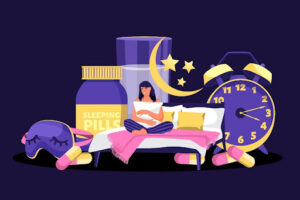Lots of people look forward to cozying up in bed for a good night’s sleep after a long day at work. However, many others dread going to bed—they struggle with insomnia and know that falling asleep will be an uphill battle. Chronic insomnia is more than just an inconvenience. It can affect energy levels, focus, and overall mental and physical health. While medication can help, it isn’t always the perfect solution to this complex issue. If you’re looking for effective insomnia treatment, there is hope. Take a look at our guide to finding relief from insomnia without medication.
Non-Medication Options for Insomnia Treatment
Sleep medications are certainly helpful for some people. But even so, they may only provide temporary relief—not to mention the daytime side effects like grogginess. If you’d rather take a more holistic approach to insomnia treatment, non-medication strategies could be effective. You can often address the root causes of insomnia with these approaches:
Cognitive Behavioral Therapy for Insomnia
Cognitive behavioral therapy for insomnia is often the first approach we recommend for those who prefer to skip medication. This structured, short-term therapy helps people identify and replace behaviors or thoughts preventing restful sleep. With consistent sessions, you could see noticeable improvements in your sleep quality and duration. CBT for insomnia often includes these components:
- Sleep Restriction Therapy—This technique limits the time you spend in bed to match the actual sleep duration, which can reinforce better sleep patterns.
- Stimulus Control—Stimulus control teaches you to associate your bedroom with only sleep and relaxation and encourages leaving stress at the door.
- Cognitive Restructuring—This strategy helps some people access deeper sleep by challenging and replacing negative thoughts about insomnia.
Relaxation Techniques
“Just relax” is probably some of the most frustrating advice you can receive as someone with insomnia. However, if you take an intentional approach to relaxation strategies, you could see some relief from your symptoms. Things like mindfulness are designed to calm both the body and mind, and if you stick to a routine, you may have an easier time falling and staying asleep. Everyone benefits from different tactics, but trying these three can provide an idea of what might work for you:
- Progressive Muscle Relaxation—Focus on tensing and relaxing each muscle group individually. This practice helps release tension throughout the body.
- Meditation and Mindfulness—Practices like guided meditation or mindfulness apps can teach you how to quiet an overactive mind.
- Breathing Exercises—Techniques like box breathing can be more beneficial than you might think. Inhale for four seconds, hold for another four, then exhale for four seconds, and repeat as necessary. This helps reduce physical stress and calms the nervous system.
Lifestyle Adjustments
Small changes to your daily habits can have a big impact on your sleep quality. While you probably won’t see results immediately, making a few lifestyle adjustments helps create a stronger foundation for quality sleep. Try these trips for better sleep hygiene:
- Go to bed and wake up at the same time every day, even on weekends.
- Limit screen exposure before bed and consider using blue-light-blocking glasses.
- Create a relaxing bedtime routine, complete with cozy activities like reading, listening to music, or taking a bath.
- Avoid caffeine and alcohol in the evening and nighttime.
- Invest in blackout curtains and a supportive mattress, and keep your room at an ideal temperature (around 65°F is often recommended).
Natural Sleep Aids and Supplements
Natural supplements like melatonin and magnesium definitely aren’t quick fixes for insomnia, but they can help address temporary sleep issues. Talk to your doctor or psychiatrist about starting a melatonin or magnesium supplement. These are available at most drugstores on an over-the-counter basis.
Exercise and Physical Activity
Exercise might increase your energy, but it can also help your sleep quality when it’s time to relax. Regular physical activity increases serotonin, reduces stress, and helps regulate circadian rhythms, all of which positively contribute to better sleep. For the best results, exercise earlier in the day, as intense workouts close to bedtime can sometimes interfere with sleep. Low-impact options such as yoga or walking are particularly beneficial for relaxation without overstimulating the body.
When to Seek Professional Help
While these non-medication strategies are effective for many, some people may require additional help. Consult a sleep specialist or doctor if your insomnia persists despite trying these solutions. Persistent insomnia could indicate underlying conditions such as sleep apnea, restless leg syndrome, or anxiety disorders that need specialized treatment.
Finding the Right Solution for You
Chronic insomnia may not be as widely discussed as depression or anxiety, but it continues to affect countless people in New Jersey and beyond. The team at Family Psychiatry and Therapy is here to help if you’re struggling to find an effective, non-medication approach to insomnia treatment. Our psychiatrists offer telehealth counseling and are glad to work with you to identify the best strategies. Contact us today to learn more.
